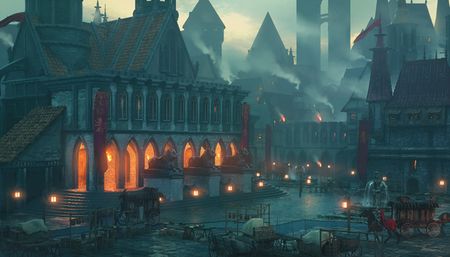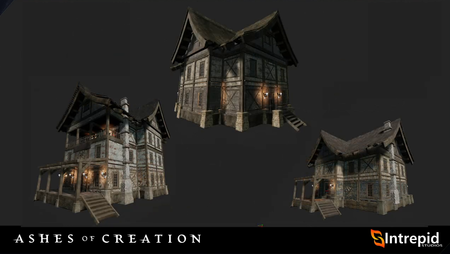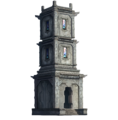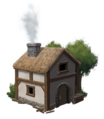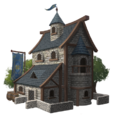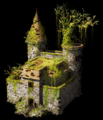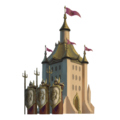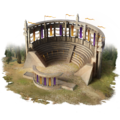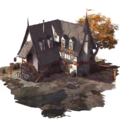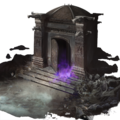Buildings
Buildings within Ashes of Creation offer goods and services as well as player housing, either within nodes or on freeholds.[3]
- Node buildings are either default buildings that come with the node, or they are constructed buildings that are initiated by the mayor and built by players.[4][5][6][7][8][9][10]
- Freehold buildings that are placed on freehold plots function as homesteads, artisan and businesses buildings.[11][12][13][3][14]
Node service buildings
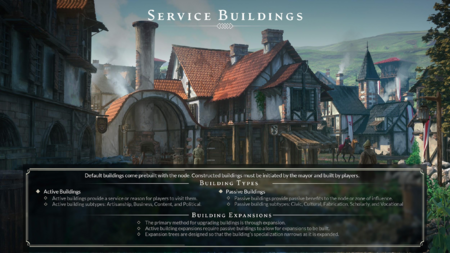
The important thing with the service building system for us is that it's a way to shape your node like a character; and to give you an exclusive niche that you can carve out in the world; or a niche that you fight over. If you go down this weaponsmithing path and you build your node to be this mecca of weaponsmithing and the node three doors down builds it, there's reason for you to conflict over it. They're taking your business. Or maybe you are in a zone and there isn't a weaponsmithing thing anywhere near you, and you do want to start to carve that path for yourself to make your node a place people visit and come to.[5] – Chris Justo
Service buildings within a node are either default buildings that come with the node, or they are constructed buildings, which are initiated by the mayor and built by players.[4][5][6][7][8][9][10] Service buildings are further broken down into two main types:[4][5]
- Active service buildings are service buildings that players directly interact with. These are further broken down into Artisanship, Business, Content, and Political categories.[4][5]
- Passive service buildings provide passive benefits to the node or its zone of influence. These buildings are broken down into Civic, Cultural, Fabrication, Scholarly, and Vocational.[4][5]
- Constructed service buildings are available to every type of node in every location. Where the uniqueness comes in is in some of the default buildings like your node-type building.[15] – Chris Justo
Service buildings are upgraded by expansions, which are unlocked through the placement of passive service buildings.[4][5]
- Building expansions unlock higher tier workstations at the cost of dedicating service building plots.[16][8]
- Node service building expansions specialize the building through a tech tree based on the stage of the node.[17][18]
Service buildings incur a regular maintenance cost of node commodities and gold from the node treasury in order to continue operations.[4][19]
Node layout and style
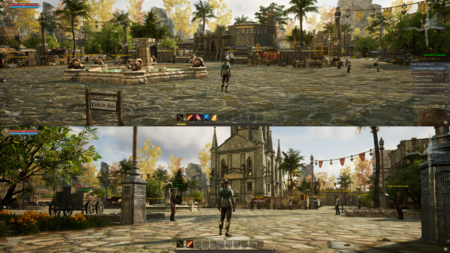
The layout and architecture within a Node’s development area are determined by influential race. For example, a stage 3 Node with the majority of player contribution being Py'rai would have a Py'rai village with Py'rai architecture. Most NPCs would be Py'rai elves, and offer questlines within the Py'rai narrative.[20] – Margaret Krohn
Each player’s contributed experience is flagged with their character race and other identifiers. When a Node advances, the race with the highest experience contribution determines the Node’s style and culture. This style and culture change can happen at every Node Stage. For example, if a Node advances to Level 2 - Encampment Stage and 51% of all experience was earned by Ren’Kai players, the Node will be a Level 2 Ren’Kai Node. If that same Node advances to a Level 3 - Village Stage Node, but the Py'Rai contributed 62% of all the experience earned, then the Node will be a Level 3 Py'Rai Node.[21] – Margaret Krohn
Node layout and style is determined by several factors:[22][23]
- The way that the node system is built is that they can exist across a spread of 18 biomes, but at the same time have to represent the cultural influence of these cultures that are intrinsically a part of a specific biome.[24] – Steven Sharif
- Environment (biome) and location of the node.[24][22][23]
- Nodes will adjust the local topography to fit the aesthetic and mechanical requirements of the node.[25]
- Currently the way that the platform system is set up, is it's capable of adjusting the topography of the node's footprint, regardless of the surrounding terrain. So the reason for that is we want to have flexibility in the presentation of the node's layout and how it is essentially both from an aesthetic standpoint as well as a mechanical standpoint with node sieges- how it's constructed and that construction should have the ability to take on a variance of different types of topography. So it shouldn't be dependent on the surrounding area. Now that's not to say that the surrounding area isn't going to have some influence over. So for example... we're experimenting a little bit with the platform tech and putting up a node up against the side of a mountain or on the edge of a cliff or something that has a beautiful vista. Those are things that we're going to test out obviously as we continue to work on the node tool and how that platform system works, but the idea is to have the node independent of the surrounding terrain.[25] – Steven Sharif
- Some parts are determined by the area it's in. Some parts are determined by the type it is. Some parts are determined by the race it is; and then the rest of it is determined by the mayor.[23] – Jeffrey Bard
- Race that contributed the highest percentage to the node's advancement will alter the racial appearance of its buildings, NPCs, and props.[26][27][22][21][23][28][29]
- All nodes, whether they're associated with a castle or associated with normal node structure, has cultural influences that replicate over to the buildings that are produced and the NPCs that are present.[31] – Steven Sharif
- The rest is determined by the node's mayor.[23]
- It should be possible for a node to complete several building projects within a mayor's one month term in office.[32]
- Q: How long would you say it will take players on average to fill/build up a node completely from wilderness to metropolis?
- A: It's one thing to get a node to a certain level: it's another thing to develop the node; and I can't really give you an on-average expectation, because there's a lot of variables at play. There's how many citizens does the node have attracted to it; what's the type of traffic that the node is attracting to it based on things like its tax rates, or the specialization that it chose to spec into, based on the building types it's chosen to build. All of those things are variables that can affect the quote-unquote "average build-out time" of a particular node. So it's difficult to give you an average when there's so many variables along those lines. But the idea is that if there is a particular project that players are interested in in developing based on the node stage, that they would have the ability to complete several of those projects as within a single term of a mayor; and a term of a mayor is one month.[32] – Steven Sharif
Racial influences
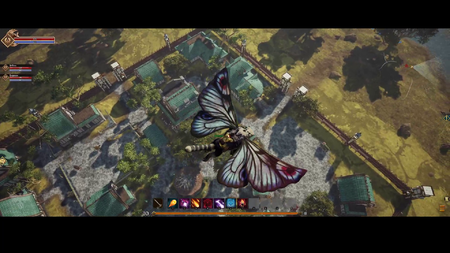
We have essentially sets that exist across all races; and each race that dons those armor sets is going to have their own racial influence on the presentation of those particular sets. So that's something that's unique in how each of the races get diversified. Additionally, the more that one particular race contributes to a node's development, it's going to manifest in that particular node's architectural influences. You're going to see the architectures of those races become manifest within the nodes as well: That's another way that we diversify each race and we present each race's culture in the game as through those architectures, through those props that exist, through the tailoring of the armor sets that the NPC might wear, to the different factions that exist. Factions will have their own affiliation with different races as well. Each race will also have some different nomenclature when it comes to the lore, or comes to locations in the world. They're going to have their own language influences as well: The way they speak is something that's going to be distinct between races; when you have dialogue trees with particular NPCs. So all of those things really go into setting an immersive world where the cultures have their own identity.[26] – Steven Sharif
Cultural influences manifest in many ways, from node and gear aesthetics to NPC languages and lore.[26][34][21]
- Gear appearance of certain armor sets is influenced by the player's race.[26]
- Node layout and style is influenced by the race that contributes the most to that node.[26]
- There is an attrition and that attrition on experience and influence is heightened based on the performance of the race in the world. So if all these nodes are Orc nodes then their attrition rate is very high to compete with the cultural establishment of new nodes because they have more influence in the world and a popular opinion is against them in their outlying regions that they do not have influence in.[35] – Steven Sharif
Node building destruction
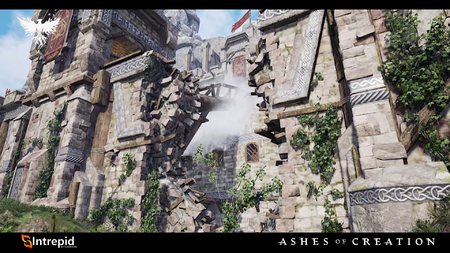
You could be more precision oriented in the decision to attack a city. Let's say it's a rival node that's trying to reach a node stage five or something and you want to disable their ability for the religious system to progress so you target the temple during the attack, or you want to disable their scholars academy from reaching a higher level so that your nodes can; or you want to disable multiple buildings that allow for experience and quests to be undertaken by its citizenship, which prevents them from keeping up in pace of experience gained with your node. These can be more precision oriented and don't have to effectualize an actual takeover of the node.[37] – Steven Sharif
Node buildings (including player housing) have hit points and can be damaged or destroyed by different systems.[18][38]
- NPC-driven events that are a response to story arcs or node atrophy.[18]
- Node sieges and node wars.[18]
- Attackers may not be capable of destroying a node during a siege. Instead they may carry out precision attacks to disable specific service-oriented buildings within the node. These buildings can be targeted with siege weapons and bombs.[37]
- Hazardous events such as tornadoes or hurricanes.[39][18]
- Mayors have the ability to demolish constructed node buildings. This will have a node mandate cost and will require player buy-in via a vote.[4][19]
- Mayors will also have the ability, if they want, to demolish constructed buildings. So if they if they so choose they can destroy a building if they don't think it's needed anymore. But this will have mandate cost and a player buy-in votes. So we want to make sure that [the] mayor can't just go and blow up the whole node if they're trying to grief or something. So this is very important and impactful decision.[4][19] – John Collins
If building maintenance is not paid, or a building is damaged as the result of an event or siege, the building will enter a state of disarray.[4][19] Any NPCs or services offered by that building will not be available until the building is repaired.[7][38]
- Players must contribute materials to repair disarrayed buildings and restore them to an operational state.[4][19][18][38][40]
If a node siege is successful, or if buildings otherwise take significant damage, they are destroyed and appear as rubble on the plot they occupied.[4][19][18]
- Node governments must clear any rubble on plots before any buildings can be reconstructed. Any prerequisites for the building reconstruction must be satisfied beforehand.[18]
- Buildings also live within a prerequisite system. So in order to build down the tech tree of what these buildings provide, as the node grows larger to access stronger building types, you may get a kink in that chain if it's destroyed and you'll have to stand that back up in order to support the service again.[18] – Steven Sharif
- If the node is destroyed by a node siege, the debris field will contain spoils that are lootable by attackers or defenders.[41][42][43][38][44][45]
- Player housing that is destroyed during a node siege can no longer be sold.[46] Furnishing and decorations are retained and can be placed again later.[46][47][48]
List of service buildings

All the services that come default with the node, we as a design team deemed essential: We want caravans to move around the world, so everyone should have a Caravansary. You want players to have storage, so everyone should have a Warehouse. But that doesn't mean those default buildings can't be upgraded and specialized themselves. But the empty plots are where you really get to start specializing your node.[49] – Chris Justo
- Default service buildings
- Constructible service buildings
Freehold buildings
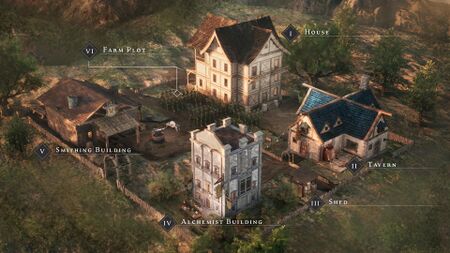
After you build your house, you can build other buildings on your Freehold. Each building needs the blueprint to start the process. If you have a cosmetic skin you want to use on a building, this is used after placing the blueprint. Once this has been placed, the building will be shown in a non-functional, construction state. Players will need to provide the required materials needed to complete the building construction, for each building on their Freehold. No Freehold has room for every possible option, so players will need to choose how to develop their Freehold by choosing to build specific artisan buildings, business buildings, and creating room for livestock and crops.[11]
Freehold buildings that can be placed on a freehold plot serve three main purposes.[11][12][13][3][14]
Freehold buildings require blueprints and materials to construct.[11][52]
- Sheds are present on empty freehold plots to provide storage for materials needed to construct freehold buildings.[53]
- Some freehold buildings have multiple tiers, with different footprint sizes.[12][54]
- Upgrading a tier will not change the size of the building in terms of footprint, but may increase in height.[54]
- Basements in freehold buildings are to be decided.[55]
Freehold taxes are calculated based on the number of permits issued for buildings on a freehold.[11][56][57][58][59]
- Buildings that require permits will have additional upkeep costs.[11]
Freehold building architecture is based on the blueprint for the building.[12][60]
- Freehold skins are applied to blueprints matching the type of building: housing, artisanship, and business.[11][12][61][62][60][63]
- The freehold building blueprints must be obtained in-game first before the cosmetic can be applied.[60][63][62]
- Players are not locked to the racial appearance of a freehold building blueprint.[64]
- The way we look at it is the freehold is your space so we want you to be able to make it look the way you want it to.[60] – Jeffrey Bard
Freehold building placement
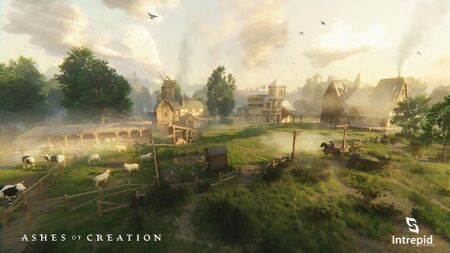
On the left we have some farmable animals- some livestock here in pens; and then we have in the middle there's a bunch of crop rows of farmable crops the players can have; and then there's a couple different examples of different freehold buildings you could have on your freehold: one of which is the house on the right and then some other freehold buildings as well, like it looks like there's a mill in the back there as well.[65] – Kory Rice
Freehold buildings and other items/props can be placed on freehold plots (by the land owner).[13][66][67][3][14]
- Freehold building permits to allow for a specific number and type of buildings to be placed on the freehold plot must be acquired from the node where the freehold deed was obtained.[11][56][57][58][68][59]
- Freehold taxes are calculated based on the number of permits issued for buildings on a freehold.[11][57][58][59]
- Currently freeholds have a combined maximum total of six artisan and business buildings that can be placed in addition to a homestead.[11][69]
- On a Freehold you can have your house, and up to six additional buildings. The additional buildings can be artisan and/or business buildings. Larger buildings may take up more room, reducing the total number of buildings that can be built on a single Freehold.[11]
- Space that is not used for freehold buildings can be utilized for other purposes, such as livestock and crop placements.[68]
- Players can manipulate the orientation of freehold buildings and items being placed on their freehold plot.[70]
- There may be a grid-based system that freehold owners can use to place items/props and buildings on their freehold plot.[66]
- Targeting dummies are planned as placeable props with functional mechanics.[71]
- Players are not able to adjust the terrain of their freeholds. Sloped terrain will result in stilts beneath placeable structures (to keep them level).[72]
Naming buildings
Buildings will be able to be named. The custom name will appear as floating text when it is targeted.[73]
Freehold building skins
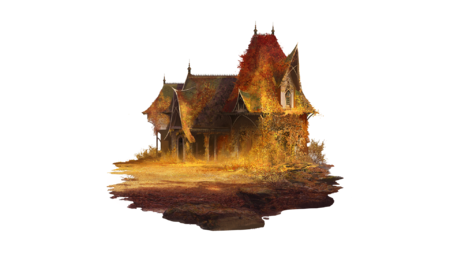
After you build your house, you can build other buildings on your Freehold. Each building needs the blueprint to start the process. If you have a cosmetic skin you want to use on a building, this is used after placing the blueprint. Once this has been placed, the building will be shown in a non-functional, construction state. Players will need to provide the required materials needed to complete the building construction, for each building on their Freehold.[11]
Freehold building skins were offered as Kickstarter and Summer crowdfunding rewards and were available in pre-order packs.[61][75][76][77][78]
- Freehold building skins can also be achieved in-game.[79]
- Freehold skins can be applied to blueprints matching the type of freehold building: housing, artisanship, and business.[11][79][12][61][62][60][63]
- Cosmetics that we have sold as part of different packs throughout the past- our pre-order system: Those cosmetics are split into three primary categories: housing, artisanship, and business; and we will have a breakdown that we're going to be releasing of the cosmetics that have come previously and which categories they exist in, but players will have the option to override the appearance of a blueprint that exists within one of those categories with an associated cosmetic skin; and that is obviously not just something that can be purchased through the pre-order system, but also can be achieved in-game as well- our cosmetics that can be applied to specific building types. And we don't get as granular where, let's say, you might have a shrine cosmetic, and you have, let's say, a blacksmith building that you wouldn't be able to apply the shrine to the blacksmith building. If the shrine exists in the artisanship lane you can apply it to any artisanship type building, but not to a house or business. so giving a little bit of additional context there.[79] – Steven Sharif
- The vast majority of cosmetic freehold skins apply to homestead buildings.[13]
- A planned feature may allow multiple buildings to be replaced by a single large cosmetic skin.[83]
- Cosmetics that are are very large in size- we will have a system that's not been developed yet, but we've been planning for this: we'll have a system where multiple buildings can be occupied space-wise by the larger cosmetic. So, a cosmetic might replace the visual appearance of one particular building, but then you'll be able to have that footprint occupy multiple buildings to replace the visual appearance. So that way you're still utilizing the similar amount of space.[79] – Steven Sharif
- Baronies won't impose any appearance restrictions on freehold buildings.[84]
Freehold building destruction
Freeholds may be attacked by any player for a period of two hours following a successful siege against its parent node.[85][86][21][87] Freeholds can also be lost by foreclosure for not paying property taxes or other fees.[11]
- Players and their allies may defend their freehold for this period of time.[87]
- Structures and guards may be obtained to defend freeholds during this period.[87]
- When it comes to losing Freeholds like this, one person’s loss is another person’s gain. While there aren’t enough Freeholds in the world for everyone to have one at the same time, this cycle of players losing Freeholds creates opportunities for other players to acquire one.[11]
After the two hour period of open combat following a successful node siege, any remaining freeholds will exist under a grace period for roughly 1 week where another node may take over the zone of influence of the freehold.[86][21]
- The freehold owner will be required to undertake a quest process to have their freehold adopted by a new node if one exists.[86]
- At the end of the grace period, if the freehold does not reside within the ZOI of a Village (stage 3) node or above, it will be destroyed.[11][21][86][88]
- If a siege is successful, then the Node is brought down to Level 0, and anyone who was a citizen of that Node is no longer a citizen. Freeholds within the Zone of Influence are subject to a period of vulnerability. These Freeholds can be destroyed by other players during a period of roughly 2 hours after a successful siege. Destroyed Freeholds are subject to material loss, and blueprints for them are mailed to the player to utilize for future placement in order to allow the player to keep their Freehold’s layout and structure. Once the vulnerability period is complete, any remaining Freeholds will exist under a grace period for roughly 1 week where another Node may take over the Zone of Influence of the Freehold.[21] – Margaret Krohn
- Q: How many times a year do you suspect that most players will be moving residence based on nodes being eliminated from sieges?
- A: There are a lot of variables that influence that answer. I'm not sure I can give an average, but what I would say is that depending on the political dynamic of a server: if a server tends to have more combat and/or sieges against nodes, that is going to increase the amount of opportunity for freeholds to be removed from the world and then replaced. I'm not sure I have an average. what I will say is that it is very important to remember that Ashes is not a PvP game and it is not a PvE game. It is a PvX game and that has a very specific meaning. It means that as these systems are developed as they are designed and they are integrated with each other: they are done so from a competitive viewpoint and how that system relates to both PvE and PvP. Freeholds are one of those systems very much so and it's because of the cyclical nature that we're attempting to achieve with the development of nodes and the destruction of nodes, the world is a rapidly and dynamically changing place really. So it's intended to be something that is constantly recycling and is leaking out different types of content and new content that revitalizes the player interest and stimulates new points of conflict or cooperation.[90] – Steven Sharif
Visuals
2023-11-01 2023-07-01 2022-09-05 2020-02-28 2020-01-31 2018-04-01
See also
References
- ↑ Blog: Creative Director's Letter
- ↑ Livestream, January 30, 2020 (1:01:59).
- ↑ 3.0 3.1 3.2 3.3 3.4 Node series part II – the Metropolis.
- ↑ 4.00 4.01 4.02 4.03 4.04 4.05 4.06 4.07 4.08 4.09 4.10 4.11 4.12 Blog: Development Update with Village Node.
- ↑ 5.0 5.1 5.2 5.3 5.4 5.5 5.6 5.7 Livestream, August 31, 2023 (50:25).
- ↑ 6.0 6.1 Video, August 31, 2023 (2:59).
- ↑ 7.0 7.1 7.2 Interview, July 9, 2023 (1:32:45).
- ↑ 8.0 8.1 8.2 Livestream, May 19, 2017 (33:57).
- ↑ 9.0 9.1 Livestream, January 20, 2018 (38:17).
- ↑ 10.0 10.1 Livestream, 2018-04-8 (PM) (51:49).
- ↑ 11.00 11.01 11.02 11.03 11.04 11.05 11.06 11.07 11.08 11.09 11.10 11.11 11.12 11.13 11.14 11.15 11.16 11.17 Blog: Exploring the Boundless Opportunities of Freeholds.
- ↑ 12.0 12.1 12.2 12.3 12.4 12.5 12.6 12.7 12.8 12.9 Development Update with Freehold Preview.
- ↑ 13.0 13.1 13.2 13.3 13.4 13.5 13.6 13.7 13.8 Livestream, April 7, 2023 (31:49).
- ↑ 14.0 14.1 14.2 Livestream, May 24, 2017 (9:58).
- ↑ Livestream, August 31, 2023 (56:18).
- ↑ Livestream, August 31, 2023 (52:56).
- ↑ Video, August 31, 2023 (34:37).
- ↑ 18.0 18.1 18.2 18.3 18.4 18.5 18.6 18.7 18.8 Livestream, March 31, 2022 (1:13:00).
- ↑ 19.0 19.1 19.2 19.3 19.4 19.5 Livestream, August 31, 2023 (57:23).
- ↑ Blog - Know Your Nodes - The Basics.
- ↑ 21.0 21.1 21.2 21.3 21.4 21.5 21.6 21.7 21.8 Blog - Know Your Nodes - Advance and Destroy.
- ↑ 22.0 22.1 22.2 Livestream, October 30, 2020 (39:17).
- ↑ 23.0 23.1 23.2 23.3 23.4 23.5 Livestream, September 27, 2018 (53:06).
- ↑ 24.0 24.1 Livestream, February 25, 2022 (41:00).
- ↑ 25.0 25.1 Livestream, February 26, 2021 (1:12:18).
- ↑ 26.0 26.1 26.2 26.3 26.4 Livestream, March 31, 2022 (4:57).
- ↑ Podcast, April 11, 2021 (29:47).
- ↑ Interview, May 11, 2018 (54:34).
- ↑ Livestream, May 26, 2017 (21:23).
- ↑ Podcast, April 11, 2021 (23:36).
- ↑ 31.0 31.1 Interview, May 11, 2018 (47:27).
- ↑ 32.0 32.1 Livestream, July 29, 2022 (1:13:09).
- ↑ Livestream, June 26, 2020 (45:32).
- ↑ 34.0 34.1 Interview, February 7, 2021 (33:00).
- ↑ 35.0 35.1 Interview, May 11, 2018 (1:00:19).
- ↑ Livestream, October 31, 2019 (36:20).
- ↑ 37.0 37.1 Livestream, November 22, 2019 (16:56).
- ↑ 38.0 38.1 38.2 38.3 Interview, July 8, 2020 (57:46).
- ↑ Forums - Livestream Q&A 2022-08-26.
- ↑ Livestream, November 22, 2019 (17:59).
- ↑ Interview, July 9, 2023 (1:36:24).
- ↑ Livestream, October 14, 2022 (52:31).
- ↑ Podcast, September 29, 2021 (14:21).
- ↑ Livestream, April 30, 2020 (1:14:44).
- ↑

- ↑ 46.0 46.1 Livestream, June 26, 2020 (1:02:12).
- ↑ Livestream, July 18, 2017 (40:14).
- ↑ Livestream, November 17, 2017 (47:10).
- ↑ 49.0 49.1 Video, August 31, 2023 (33:07).
- ↑ Livestream, June 30, 2023 (12:11).
- ↑ Video, June 30, 2023 (15:34).
- ↑

- ↑ Livestream, June 30, 2023 (18:45).
- ↑ 54.0 54.1 Interview, July 8, 2020 (45:23).
- ↑ Livestream, June 28, 2019 (1:09:22).
- ↑ 56.0 56.1

- ↑ 57.0 57.1 57.2 Interview, July 9, 2023 (54:46).
- ↑ 58.0 58.1 58.2 Livestream, June 30, 2023 (1:45:22).
- ↑ 59.0 59.1 59.2

- ↑ 60.0 60.1 60.2 60.3 60.4 60.5 Livestream, August 28, 2020 (2:14:06).
- ↑ 61.0 61.1 61.2 61.3 Livestream, June 30, 2023 (22:05).
- ↑ 62.0 62.1 62.2 62.3 Livestream, November 30, 2020 (57:50).
- ↑ 63.0 63.1 63.2 63.3

- ↑ Livestream, May 26, 2017 (44:11).
- ↑ 65.0 65.1 Livestream, June 30, 2023 (7:36).
- ↑ 66.0 66.1 Livestream, May 29, 2020 (41:27).
- ↑ Livestream, October 16, 2017 (56:42).
- ↑ 68.0 68.1 Livestream, June 30, 2023 (1:21:48).
- ↑ 69.0 69.1 Interview, July 9, 2023 (33:55).
- ↑ Livestream, June 30, 2023 (1:36:52).
- ↑

- ↑ Livestream, January 31, 2024 (1:24:57).
- ↑ Livestream, October 31, 2018 (46:18).
- ↑ Ashes of Creation Store: Sunbeam's Remembrance.
- ↑
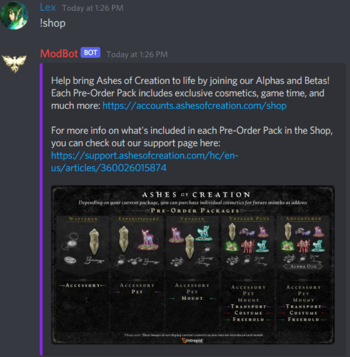
- ↑ What is included with my Pre-Order package?
- ↑

- ↑
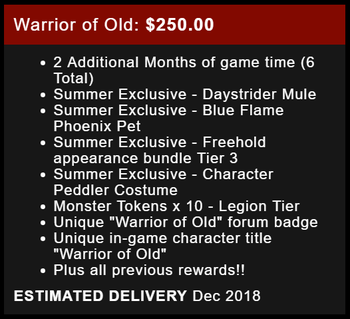
- ↑ 79.0 79.1 79.2 79.3 Livestream, June 30, 2023 (23:40).
- ↑

- ↑ 81.0 81.1 Livestream, June 30, 2023 (1:15:34).
- ↑

- ↑ Livestream, June 30, 2023 (1:21:07).
- ↑ Interview, July 9, 2023 (31:18).
- ↑ Livestream, November 19, 2021 (54:26).
- ↑ 86.0 86.1 86.2 86.3 Livestream, August 28, 2020 (2:04:00).
- ↑ 87.0 87.1 87.2 Livestream, May 19, 2017 (28:04).
- ↑ Livestream, May 19, 2017 (29:34).
- ↑ Livestream, July 28, 2023 (1:26:16).
- ↑ Livestream, June 30, 2023 (1:39:22).
